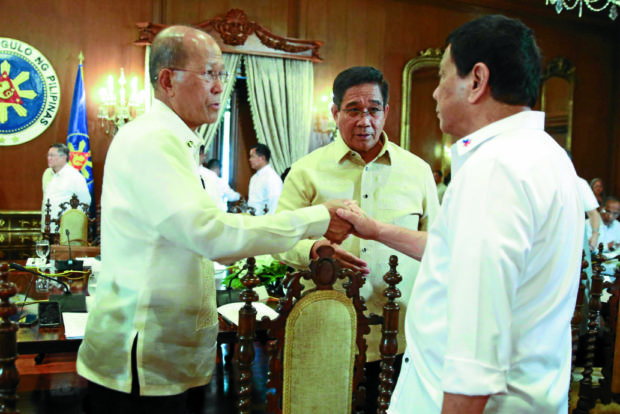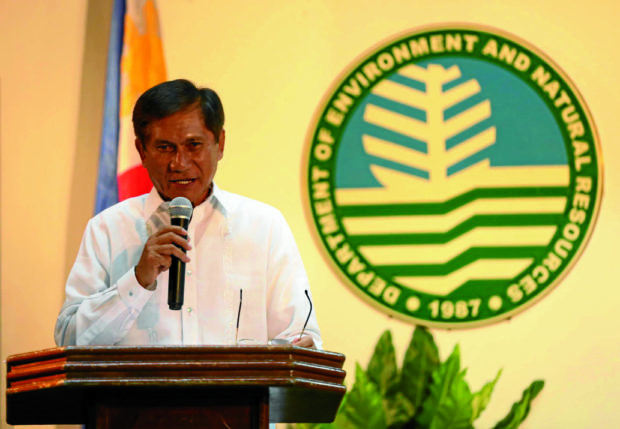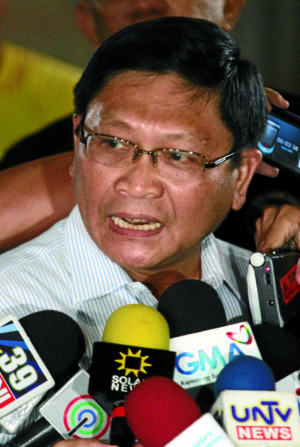Duterte hires 59 former AFP, PNP men to Cabinet, agencies
Six former Armed Forces chief of staff and four officers who turned renegades are among former men in uniform appointed by President Duterte to key civilian positions in his administration.
A Philippine National Police intelligence officer convicted for the abduction of a foreigner but eventually acquitted by the Supreme Court, a general who testified against fellow officers linked to the 2004 election fraud scandal, and a former PNP chief, who accused former President Benigno Aquino III of treason, have also also joined the government bureaucracy.
The Inquirer has listed 59 retired military generals, police directors, admirals and colonels who have been appointed to the Cabinet and other agencies, including government-owned corporations. (See list on this page.)
Many of them are either from Mindanao, or were assigned to Davao City where Mr. Duterte served as mayor for 22 years.
In a speech on June 9 before the Army’s 603rd Brigade in Maguindanao province, the President said the military officials closest to him were those who were once assigned to Davao.
Article continues after this advertisement“I’m looking for security. Of course, (Defense chief) Delfin (Lorenzana) and I … we go a long way back,” Mr. Duterte said. “So, those who are closest to me are those who were assigned in Davao … like (Philippine National Police chief Ronald) Bato (dela Rosa) … Morente, Cuy. They all went through Davao.”
Article continues after this advertisement‘Astute’ move
Political analyst Ramon Casiple said the appointments were an astute move by Mr. Duterte.
“He’s banking that since these (former generals) were close to him in the past, and I think it’s the same today, he’s expecting that he can still have a good relationship with the military,” Casiple said.
The appointments did not surprise retired Brig. Gen. Dionisio Tan-Gatue, a former police director in the Davao region, which had its headquarters at Camp Catitipan in Davao City.
In the early 1980s, Mr. Duterte, then a prosecutor, was a frequent visitor to the camp, according to Tan-Gatue. “He had lots of friends in the military, especially from intelligence,” he said.
Tan-Gatue said it was unfair to lump retired military officers with the unqualified. “Retirees who hang their uniforms for good are merely going back to where they were before but with added military experience. Isn’t that a plus?”
“Like any political party with spoils to allocate, of course, positions are given (as reward),” he also said.
Qualified
With their “experience, discipline and perspective of management” acquired from years in the military, generals are “qualified for civilian assignments,” Magdalo Rep. Gary Alejano said.
“But some positions also require a degree of expertise, which unfortunately some appointees do not have,” Alejano said.
He cited the case of former Army Maj. Jason Aquino, who was named chief of the National Food Authority, and ex-Marine Capt. Nicanor Faeldon, head of the Bureau of Customs.
Alejano, Aquino and Faeldon were among the young officers who called for the ouster of then President Gloria Macapagal-Arroyo in July 2003. Some of them were pardoned by Arroyo upon admission of guilt. The rest were granted amnesty by her successor, President Benigno Aquino III.
The 2016 presidential election would split the group: Faeldon and Aquino joined Mr. Duterte’s camp, while the rest of the Magdalo led by Sen. Antonio Trillanes IV became Mr. Duterte’s critics.
Alejano said Aquino and Faeldon lacked the expertise to run their agencies. If the goal was to eliminate corruption in government agencies, “are we sure these appointees are not corrupt?” Alejano asked.
Balancing act
The Magdalo representative said Mr. Duterte could be using the military retirees to “balance” the appointment of leftists to the Cabinet and other government agencies.
The President has appointed former Anakpawis Rep. Rafael Mariano head of the Department of Agrarian Reform (DAR), former Gabriela Rep. Liza Maza head of the National Anti-Poverty Commission, former University of the Philippines professor Judy Taguiwalo head of the Department of Social Welfare and Development, and labor leader Joel Maglungsod undersecretary of the Department of Labor and Employment.
Edre Olalia, secretary general of the National Union of People’s Lawyers, said the military appointees reinforced the President’s “draconian tendencies.”
“How could it balance the Left, when they (leftists) are not that high in the hierarchy?” Olalia said. “DAR is a very big step, yes, but it’s not really that high. My personal opinion is that the leftist in government are just a ‘showcase.’”
Keeping AFP in line
For Casiple, Mr. Duterte’s decision to name more military men to his Cabinet was part of his efforts to woo and keep the Armed Forces of the Philippines in line as the President pursued peace talks with the Communist Party of the Philippines.
“The message to the military is: ‘I have no plans of sidelining you,” Casiple said.
He said some in the military thought Mr. Duterte had given too many concessions to the communists and yet these had not borne fruit.
‘Internal-looking animal’
Military historian Jose Antonio Custodio said that despite Mr. Duterte’s overtures to the communists and his efforts to steer the Philippines closer to China, the President’s relationship with the AFP remained “relatively good.”
“The military’s being listened to… He’s continuing the modernization program. It’s not bad,” Custodio said.
He said the AFP was mainly still concerned with internal threats like the communist-led New People’s Army (NPA) and Moro secessionists.
“The AFP is an internal-looking animal. China is like an abstract thing to it because it’s main security threats are internal. Yes, there are officers who are concerned about China but it is the NPA that will elicit more anger from them,” Custodio said.
“The thing with (Mr. Duterte), he has been able to balance that out by appearing tough (on the NPA) while catering to the military’s needs also,” he said.
Assigning police and military retirees to important portfolios in civil service was not invented by Mr. Duterte.
The late dictator Ferdinand Marcos was known to reciprocate loyalty with “juicy” positions in government agencies and quasi institutions.
When Marcos declared martial law in 1972, he assigned select military to run civilian agencies.
The new assignments exposed the soldiers to “nonmilitary oriented” work, and encouraged many to pursue studies at the Asian Institute of Management and at the National Defense College of the Philippines where civilian and military competencies were merged, Custodio pointed out.
This nonmilitary trademark of the military would continue even after the fall of Marcos.
The administrations of Corazon Aquino, Fidel Ramos, Joseph Estrada, Gloria Macapagal-Arroyo and Benigno Aquino III named former men in uniform to key government agencies.
Different animal
Custodio said there was no reason to be fearful of former military officials in the Duterte administration.
“The military today is a different animal. There may be individual trigger happy soldier, but an institution, the AFP is not trigger-happy anymore,” he said.
The military historian said this was due to the various reforms in the AFP. “If you notice, the AFP has become a corporate entity.”
Custodio said the presence of many former military men in the Duterte administration was not a foreboding of martial law or one-man rule covering the whole country.
“I don’t think it’s martial law. Why? Because if you want to declare martial law, you engage those in active service and not the retired. In the dynamics of the military, once you are retired, you’re out of the command structure,” he said.
He noted that when Marcos declared martial law in 1972, “there were no military men in his Cabinet.”
Custodio said the key officials to watch were the “AFP chief of staff, area commanders and other generals” in active service.
The appointees
Following are the former military and police officers appointed to civilian posts:
1. Roberto Lastimoso — chair, Philippine National Railways
2. Miguel dela Cruz Abaya — director, Development Bank of the Philippines
3. Delfin Lorenzana — secretary, Department of National Defense (DND)
4. Francisco Villaroman — director, Clark Development Corp. (CDC)
5. Alex Monteagudo — director general, National Intelligence Coordination Agency
6. Hermogenes Esperon Jr. — director general, National Security Council (NSC)
7. Roy Cimatu — secretary, Department of Environment and Natural Resources
8. Benjamin Defensor — director, CDC
9. Ricardo David — undersecretary, DND
10. Emmanuel Bautista — executive director, Office of the Executive Director on Security, Justice and Peace Cluster
11. Ricardo Visaya — administrator, National Irrigation Administration
12. Jason Aquino — administrator, National Food Authority
13. Nicanor Faeldon — commissioner, Bureau of Customs
14. Danilo Lim — chair, Metropolitan Manila Development Authority
15. Eduardo “Red” Kapunan — ambassador to Myanmar
16. Catalino Cuy — officer in charge and undersecretary for peace and order, Department of the Interior and Local Government (DILG)
17. Nestor Quinsay Jr. — assistant secretary, DILG
18. Arthur Tabaquero — undersecretary, Presidential Adviser on Military Affairs
19. Rufino Lopez — deputy director general, NSC
20. Cardozo Luna — undersecretary, DND
21. Eduardo del Rosario — undersecretary for civil, veterans and retiree affairs, DND
22. Raymundo Elefante — undersecretary for finance and materiel, DND
23. Cesar Yano — undersecretary for defense operations, DND
24. Ricardo Jalad — administrator, Office of Civil Defense (OCD); executive director, National Disaster Risk Reduction and Management Council
25. Marciano Paynor Jr. — undersecretary, Office of the President (OP)
26. Ernesto Carolina — administrator, Philippine Veterans Affairs Office (PVAO)
27. Raul Caballes — deputy administrator, PVAO
28. Rodolfo Demosthenes Santillan — deputy administrator for operations, OCD
29. Jonathan Martir — government arsenal director, DND
30. Anselmo Simeon Pinili — special envoy on transnational crime, OP
31. Allan Guisihan — executive director, Philippine Center on Transnational Crime
32. Dickson Hermoso — assistant secretary for peace and security affairs, Office of the Presidential Adviser on the Peace Process
33. Edgar Galvante — assistant secretary, Land Transportation Office
34. Isidro Lapeña — director general, Philippine Drug Enforcement Agency (PDEA)
35. Jesus Fajardo — deputy director general for administration, PDEA
36. Jaime Morente — commissioner, Bureau of Immigration
37. Eduardo Gongona — national director, Bureau of Fisheries and Aquatic Resources
38. Jose Jorge Corpuz — chair, Philippine Charity Sweepstakes Office (PCSO)
39. Alexander Balutan — general manager, PCSO
40. Reynaldo Berroya — administrator, Light Rail Transit Authority
41. Rodolfo J. Garcia — general manager, Metro Rail Transit 3
42. Reuben Lista — president and CEO, Philippine National Oil Co. (PNOC)
43. Oscar Rabena — director, PNOC-Exploration Corp.
44. Bruce Concepcion — director, PNOC
45. Adolf Borje — director, PNOC
46. Alan Luga — trustee, Government Service Insurance System
47. Ferdinand Golez — director, Bases Conversion and Development Authority (BCDA)
48. Romeo Poquiz — director, BCDA
49. Raul Urgello — director, Philippine Sugar Corp.
50. Abraham Bagasin — director, John Hay Management Corp. (JHMC)
51. Reynald Mapagu — director, North Luzon Railway Corp.
52. Michael Mellijor Tulen — director, Philippine National Railways
53. Roberto Estioko — president, National Defense College of the Philippines (NDCP)
54. Rolando Jungco — executive vice president, NDCP
55. Jessie Cardona — technical assistant, Office of the Executive Secretary-AntiTerrorism Council-Program Management Center
56. Jim Sydiongco — director general, Civil Aviation Authority of the Philippines (CAAP)
57. Manuel Antonio Tamayo — deputy director general, CAAP
58. Eduardo Davalan — director, JHMC
59. Eduardo Año — incoming secretary, DILG


